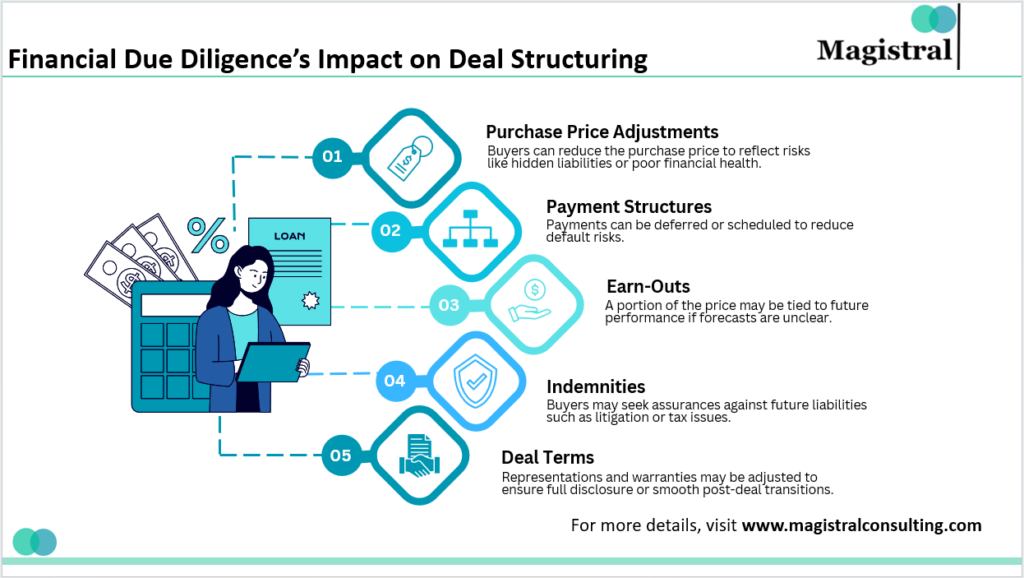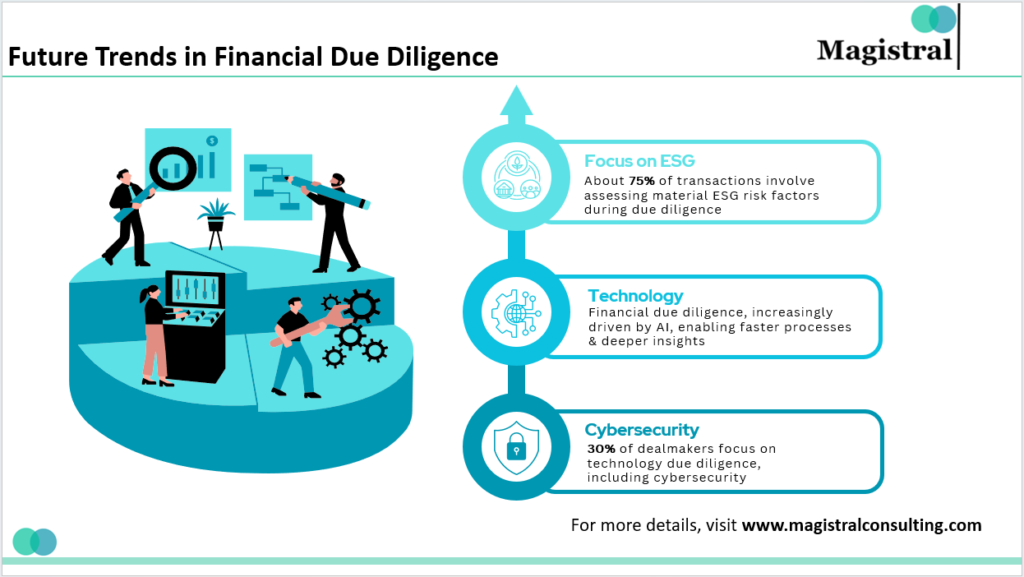When it comes to mergers, acquisitions and every investment decision, financial due diligence is important to ensure undertaking the transaction. Review of financials does not only mean checking the balance sheets and cash flow statements; rather it is more of an investigation that seeks the risks, the irregularities, and the prospects that may be hidden in the company. Furthermore, it assures that the figures in the financial reports correspond to the true state of the company and that potential investors have all the information they need. A due diligence process can either support the soundness of the acquisition or expose costly hairs that could have been expensive if overlooked.
Therefore, it can be concluded that financial due diligence is essential in assessing the financial position of the target and provides a basis for making deal decisions.
Audit vs Due Diligence
An audit is an external examination of a company’s financial statements, which is conducted in detail by professional auditors to check the accuracy and conformity to the accepted standards (for example: GAAP or IFRS). Historical financial information is the primary focus of the audit, establishing whether there are any inaccuracies, and validating compliance with the law. The result is an opinion given on the outcome of the audit.
Due diligence, on the other hand, is an intricate and original search that is often used in the course of mergers, acquisitions, or investments. This includes not only the financials but operations, legal aspects, and risks as well to assess how fit a business is. It is intended to mitigate risks, check the truth of the statements made about the target and its prospects, and assist in making decisions related to the transaction.
Therefore, audits pay more attention to the financial figures and their legality while due diligence looks at the overall transaction in terms of business viability and risks.
Impact on Deal Structuring
The outcome of the value assessment in M&A transactions involves adjusting the purchase price based on findings from financial due diligence. When serious adverse financial conditions are revealed, the buyer may lower the offer and negotiate additional warranties, earn-out provisions, or insurance to mitigate risk. Understanding these risks allows both parties to formulate more competitive and cohesive transaction structures. This process emphasizes the critical role of due diligence in ensuring informed decision-making and effective negotiation in M&A deals.

Financial Due Diligence’s Impact on Deal Structuring
Financial due diligence is perhaps an area that has both transformed and influenced the deal structuring by the risks it exposes and where there is negotiation. The most important aspects that are influenced include:
Purchase Price Adjustments
In the case of underlying risk elements such as hidden liabilities or poor financial health, a buyer is allowed to mark down the price in order to mirror such risks.
Indemnities
Sometimes buyers will insist on some form of assurance that they will not be affected by uncovered risks in the future like litigation that could be occasioned by debt obligations or taxes.
Earn-Outs
If future forecasts are not clear, a portion of the larger purchase price could be linked to later results, thereby minimizing the chances of paying too much.
Payment Structures
It may be suitable to postpone or schedule the payment to minimize the possibilities of defaults.
Deal Terms
Even representations and warranties may be altered to protect against nondisclosure or no disruption after the transaction has taken place.
Future Trends in Financial Due Diligence
The landscape of financial due diligence is evolving rapidly. Some future trends include:

Future Trends in Financial Due Diligence
Increased Focus on ESG (Environmental, Social, and Governance)
Today, it is becoming increasingly evident that due diligence is not purely financial. Investors are becoming more aware and concerned about how companies deal with these factors. Research indicates that the influence of ESG risk on the value of a transaction is significant. As many as 74% of transactions include a due diligence element where material ESG risk factors are assessed and uncovered. Such tendencies are common in Europe with 71% of the respondents expecting more emphasis to be placed on ESG aspects of the due diligence engagements. ESG maturity is beneficial to valuation; it can translate into valuation uplift of 6-11% for the company.
Cybersecurity
The danger posed by cyber threats has increased; this has also made it necessary to consider the cybersecurity structure of the company being evaluated financially. Statista 2023 reported that 30 percent of dealmakers covered technology due diligence as a key focus area, with cybersecurity included. This is mainly due to the risks associated with data breaches when it is necessary to keep private matters such as financial and operational information within a few individuals during the course of a deal.
Technology-Driven Processes
Financial due diligence in today’s world is being improved by the introduction of AI and advanced analytical capabilities. With the help of automation tools and insights that are powered by AIs, due diligence processes can be executed in shorter durations with better-elaborated analysis of firms’ financial performance. These technologies are already transforming the process; providing quick and higher levels of information for the decision-makers.
Regional Variations in Financial Due Diligence
Financial due diligence trends vary by region due to differences in market maturity, regulatory environments, and economic conditions.
North America
In this region, financial due diligence mostly spotlights openness and transparency, especially in situating disguised debts, tax requirements, and capital liquidity. The US in particular stands out due to its intense expectations on legal frameworks of operation, hence a careful holistic check of laws and financial matters is required by firms.
Europe
With due diligence extending its definition, many of the practices observed in financial due diligence in the European countries are greatly centered on the legislations of various states. As there are many transactions in the UK post-Brexit, cross-border due diligence has also become a prevalent practice of late. The issue of ESG factors has also started emerging as an important agenda in this region.
Asia-Pacific
Financial due diligence in countries such as China and India face a heightened level of risk because the accounting standards and the regulatory environment there are not very transparent. Financial due diligence in this part of the world tends to drill down more on specific aspects, such as looking at the costs of doing business as well as local financial reporting standards, taxation, and the potential growth of a given market.
Middle East & Africa
These regions present more difficulties in carrying out financial due diligence buy-sided for instance due to lower-developed financial systems and differing regulatory practices. Usually, in addition to the standard financial metrics, the political and economic assessment considering the local conditions will be included in the financial due diligence more.
Magistral’s Services for Financial Due Diligence
Magistral Consulting provides all-encompassing financial due diligence services to tackle mergers and acquisitions. Our strategy aims to present better views on financial information of prospective companies, and their competitive surroundings. Services offered by Magistral are as follows:
Comprehensive Financial Analysis
The scope of work entails the evaluation of the financial statements like the balance sheet(s), income statement(s), and cash flow statement(s) with the view to analyze the financial position and operating trend of the subject company.
Risk Assessment and Mitigation
The range of financial risks, such as undisclosed debt, tax or regulatory risks, and other related issues that are likely to be encountered during the course of the transaction, before and after closings are looked into by our team, including how to deal with them.
Quality of Earnings Analysis
Investors are often wary of the reported number without understanding the revenue, expenses, and what’s called ‘non-recurring’ adjustments with respect to the targets earnings, thus gauging the quality and reliability of the targets earnings.
Valuation Assistance
In this case, we assist in establishing the market price of the target company by employing several approaches to valuation like the Discounted Cash Flow (DCF) or Comparable Company Analysis so that the investors don’t make incorrect pricing.
Post-Transaction Integration Planning
In regard to completing a deal, we help the clients develop financial integration strategies to ensure that the financial systems and processes as well as reporting are properly integrated and aligned with that of the buyer.
About Magistral Consulting
Magistral Consulting has helped multiple funds and companies in outsourcing operations activities. It has service offerings for Private Equity, Venture Capital, Family Offices, Investment Banks, Asset Managers, Hedge Funds, Financial Consultants, Real Estate, REITs, RE funds, Corporates, and Portfolio companies. Its functional expertise is around Deal origination, Deal Execution, Due Diligence, Financial Modelling, Portfolio Management, and Equity Research
For setting up an appointment with a Magistral representative visit www.magistralconsulting.com/contact
About the Author
The article is authored by the Marketing Department of Magistral Consulting. For any business inquiries, you can reach out to prabhash.choudhary@magistralconsulting.com
Why is financial due diligence important in M&A transactions?
Financial due diligence is crucial as it helps buyers make informed decisions by revealing the true financial position of the target company. It can identify hidden liabilities, assess financial health, and uncover opportunities, thereby preventing costly mistakes in the transaction process.
What are the key components of financial due diligence?
Key components typically include reviewing historical financial statements, assessing cash flows, evaluating operational efficiency, conducting industry analysis, and identifying potential risks or irregularities. It may also involve preparing due diligence questionnaires and investment memorandums.
How can financial due diligence impact deal structuring?
Findings from financial due diligence can significantly influence the purchase price and terms of the deal. Buyers may negotiate price adjustments, additional warranties, earn-out provisions, or alternative payment structures to mitigate risks uncovered during the due diligence process.
What trends are shaping the future of financial due diligence?
Future trends include a growing emphasis on Environmental, Social, and Governance (ESG) factors, increased focus on cybersecurity assessments, and the use of technology-driven processes such as AI and automation to enhance the efficiency and accuracy of due diligence efforts.